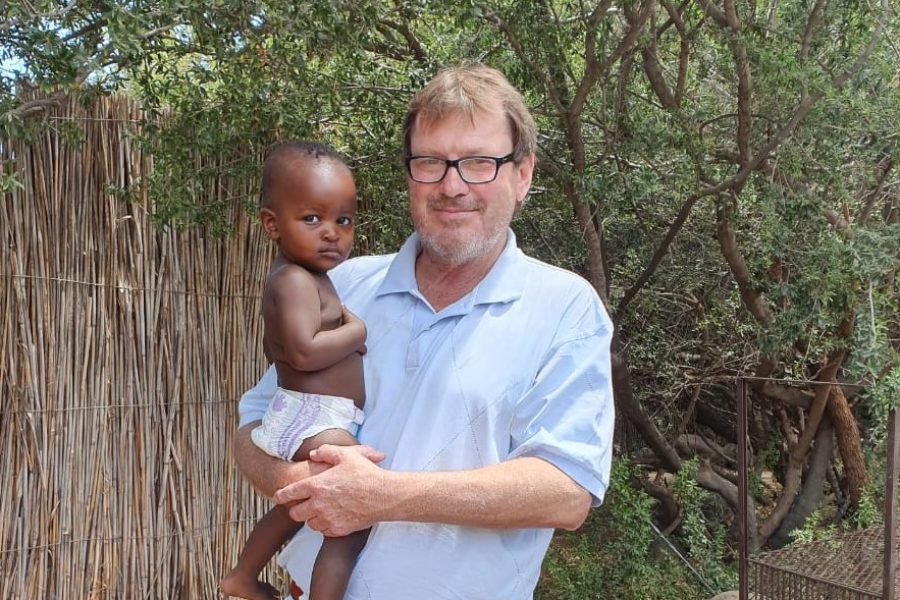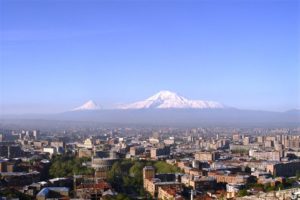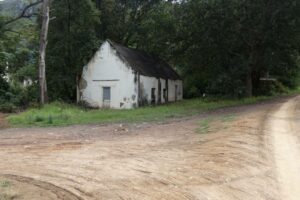I wrote in my previous post how badly Britain and Germany stumbled morally speaking (ignoring their political folly for a moment) in the first decade of the 20th century far away in Southern Africa. They crossed lines that were unthinkable before. Not only did they provoke wars with distant peoples far smaller and weaker (as mighty empires) in an effort to take their lands, gold and cattle, but they went so far as to openly make war against innocent women and children and even the elderly. The Boer War (1899 – 1902) and the Herero War (1904) with their concentration camps reduced the Afrikaner people by 10%, the Nama by 50% and the Herero with 80%.
We saw why it happened. For the best part of two centuries Enlightenment prophets in Europe undermined and attacked the Bible as God’s Word, championing man’s autonomy and radical freedom, while secretly feeding his hubris.
Some tried to warn (Dostoevsky, Van Prinsterer and even Albert Schweitzer were mentioned) but Europe’s establishment was unimpressed. The shock-waves of the Boer and Herero Wars respectively had little effect. Europe was sailing confidently into the night, like the Titanic on her maiden voyage of 1912, thinking that not even God could sink her.
But then came the big bang. World War I broke out like a vicious fight in a toddler’s playpen, for no specific reason. After all the mayhem and bloodshed, no-one could even tell what it was all about. Looking back we know: hubris had a lot to do with it…
My point was this: All that hubris was not caused by Jesus and his apostles, whom Europe’s leading thinkers despised so much for two centuries. Rather, it was the net-result of human arrogance and its delusions about absolute freedom (something my liberal professors in Pretoria never taught us 35 years ago). For, as soon as the European lads were far from home, they had a go for it on the prairies of South Africa and in the hot sands of Namibia. They knew, they could get a lot done, before news would ever reach mama’s ears or the bishop’s sermons back home in Europe, and so “Great” Britain and “Imperial” Germany committed atrocious crimes against tiny nations far away.
But as the twentieth century rolled on, the Afrikaner in South Africa also stepped into the snare of national pride and greed. I am well aware that I am writing here as a white South African, who has not experienced the humiliation that apartheid brought upon millions of my fellow countrymen, and yet, white South Africans have suffered under the stigma of that odious system too. For half a century we were the scum of the earth.
South Africa stumbled too
Maybe we did not stumble as badly as Germany and Britain did, and maybe our motives were more noble, and yet we stumbled badly for sure. After all our struggles to get back onto our feet after the Boer War, national pride and even greed sprang up as time moved into the forties, fifties and sixties. In 1948 the National Party was voted into power with Apartheid as its platform. To be sure, we inherited racial segregation from the British. Apartheid simply meant “separateness.” But now we were going to implement racial segregation (with all its humiliating implications) by law – to secure our own national survival and prosperity as Europeans who have settled in a distant continent. At least we did not kill our natives or enslave them. But we were going to implement separateness on every level of society, except for the labour market, because we needed the “non-white” labour power so badly.
I think Chief Albert Luthuli of the ANC basically got it right when he said in Rosettenville in 1949:
“The spirit of selfish exclusiveness shows itself in a tendency to regard civilization as the sole possession and production of white people. Hence the plea that Africans must develop along their own lines. The tragedy… behind this claim is that white South Africa tends to forget its God-given mission to spread civilization and not to hoard it, and thus to ensure its survival and growth” (John W. de Cruchy, The Church Struggle in South Africa, p. 56)
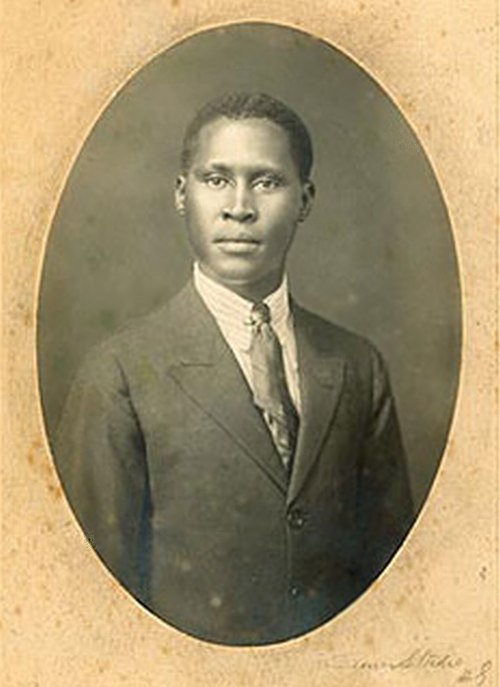
There’s a lot of truth in Luthuli’s words, even though thankfully we did not hoard everything for ourselves. Examples are too many to mention. Here are two. I recall how as a kid I sometimes went with my dad to the University of the North where he trained black teachers for twenty years. I vividly recall how impressed I was with the beautiful campus, nestled away in the rocky hills of the Northern Transvaal. It was a campus built for the Northern-Sotho people by the white government. In fact, the most senior minister in Mr. Ramaphosa’s cabinet today, had my father as her professor for two years! There were many other examples similar to this, like the largest hospital in the world at the time, the Baragwanath in Soweto, built with “white” tax-payer money.
Apartheid was declared a “crime against humanity” sometime in the seventies by the United Nations. For decades South Africa was the Cinderella of the globe. No amount of water could ever wash her clean. Europe and America, plagued by real and imagined colonial guilt, took it all out on their little half-brother and sister in Southern Africa, South Africa and Rhodesia. The left, like always, was so happy to capitalize on it all. White South Africans were painted as the monsters of the universe. Remember, South Africa was the only country ever, against which both the East and the West imposed sanctions unanimously; the only country ever barred both from the Olympic Games and the United Nations for ages. Wow! Were we really that bad?
The only way we can answer the question is to take Isaiah 28:17 as our norm: “Thus says the Lord: ‘I will make justice the measuring line and righteousness the plumb line’”. Now, if that is our standard (and please read Isaiah for its context) and we look at the cumulative effect of Apartheid on the psyche of our nation, then we have to say – that in spite of some good intentions – that it was a indeed a massive mistake and incredibly short-sighted. It was an unjust and oppressive system.
But was it all bad?
How bad was it? When the Nobel Prize winner Mr. FW de Klerk dared to say that it was not all bad, he got himself into very hot waters in the hyper-politically-correct milieu of South Africa. The famed South African historian and author of The Afrikaners : Biography of a People – Herman Giliomee – came to the same conclusion.
What would “all bad” look like? In my book it would be downright evil, like hell on earth. There were many times and places when the twentieth century looked and felt like hell on earth, but South Africa, in my estimation, was very far from it. Most Africans, despite Apartheid, wished to come and live there, while today nearly everyone tries to flee. Finding a job, and strolling down the street without fear (also in the townships), was taken for granted until late in the 20th Century. Keep in mind that Afrikaners ruled South Africa from 1910 to 1990, when they (not Mandela) eventually dismantled the whole system themselves.
So let briefly us look at three unbiased sources to prove my point.
In a six-part BBC documentary series (or book) War of the World, Harvard historian Niall Ferguson tells the grim tale of the death and destruction of the twentieth century. The entire century looks like one endless blood-fest from beginning to end. From the Turkish genocide of the Armenians, right up to Rwandan genocide of ‘94 and the Balkan wars, it was one long war. And guess what? Most of these wars were caused by… race, says Ferguson. One race viewing the other as vermin. And yet, coming to the end of the documentary series, you must ask yourself: “Where is South Africa in all this? Why did the bloodletting not spill over to our shores? Why did we not view each other as vermin?”
Here’s our second source: Nigel Cawthorne’s 100 Tyrants. History Most Evil Despots and Dictators. Cawthorne has forty tyrants from the twentieth century alone. Ten from Latin America, nine from Africa, eight from Europe. And yet, not even one from South Africa. Was that the country run by Afrikaners for eight decades?
Here’s my last source: David Berlinski’s The Devil’s Delusion – Atheism and its Scientific Pretensions. He’s out to prove Harvard Psychology professor Steven Pinker wrong. The latter argued that modernity has created a shockingly happy and noble world. So Berlinski provided a three-page catalog of 62 conflicts killing over 162 million people during the last century. Not such a happy and noble picture. Dr. Pinker will have to ‘tink’ again.
But again, you go through the endless list of massacres and mayhem, and you ask yourself: Where is South Africa in three pages or sordid savagery? Nowhere. But, if I listen to some leftist gurus, we ought to be right up there a few slots under Hitler and Stalin’s brutal regimes. Berlinski even mentions three slaughter-parties right next door to us, in Zimbabwe, Mozambique and Angola, but South Africa is nowhere to be found on three pages. Amazing.
Everything was not so bad under Afrikaner-rule. The idea that everything was bad did not come from our own people. It came from a relentless media campaign launched against South Africa from the liberal West and the Communist East. Here is the proof. In 1976 a study was conducted by America’s five largest news outlets to find out which country came in for the most bashing. The Vietnam War was just over and America’s conscience was bothering her relentlessly. The result was quite stunning. In third place was Cuba with seven stories. In second the monstrous Khmer Rouge with 16 stories. And in the first place was the Republic of South Africa with a whopping 513 stories! I recall it well. We lived through it. It is hard not to cry. (See Harry Booyens’ riveting and amazingly well-documented work AmaBhulu – The Birth and the Death of the Second America , page 434.)
And yet we were the Cinderella of the globe, or should I say the Dracula in the eyes of many. But we did not make it into Ferguson, Cawthorne or Berlinski’s books. Strange. It does seem to me too many Westerners lived with a bad conscience during those years, looking for a little brother or sister to whip into shape. It is so easy, when the target of your abuse is far away, and if you can harvest a lot of votes by sounding sanctimonious, to over-simplify a complex scenario and constantly scold those who don’t seem to get your point.
Why was there no major blood-letting in South Africa?
So why did we not make it into these books and films? The answer again is simple. Where are the mass graves, the gas chambers, the skeleton piles? Paton’s Cry the Beloved Country would have told you if there were any. When they asked Bishop Tutu’s Truth and Reconciliation Commission in the early 90’s how many died under white rule, he could only come up with 2000 (i.e., two thousand). And that number included those killed during a 21 year border-war against a Soviet-inspired enemy. And yet, even those lives were too many. When I stood in the building where Steve Biko hid for safety during the seventies, before he died in police detention, I felt the pain and the stain.
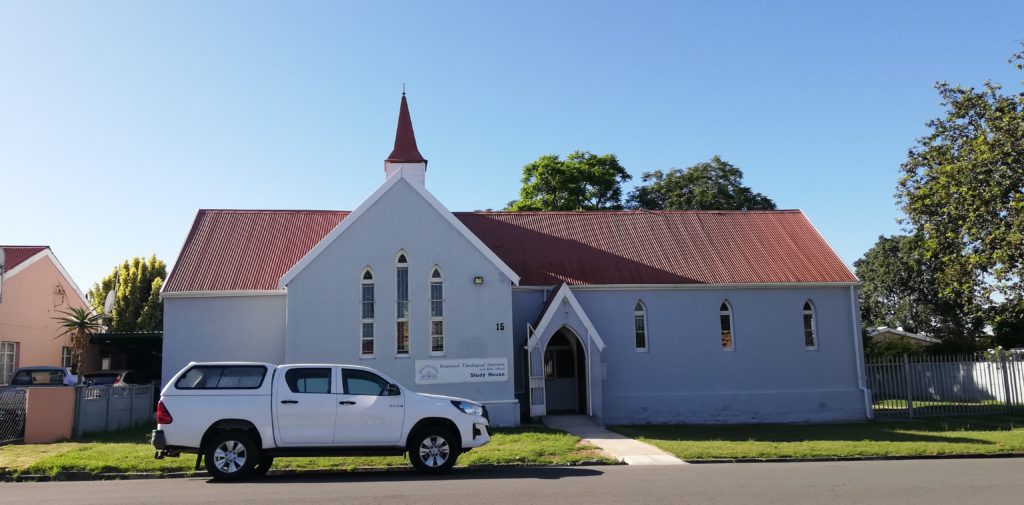
The answer to the riddle is not so hard to find. Why did South Africa have no killing fields? Why could Mr. Nelson Mandela dare to hand the Rugby World Cup with a big smile to the Springbok captain, a year after white rule ended? Or why did Mandela for that matter have a respected Afrikaner woman, Zelda le Grange, as his personal assistant for many years until his death?
Because we were, except for a few on the fringes, not the kind of folks the liberal West tried to make us out to be. In fact, if we were so bad, how could so many Western countries eagerly accept white South Africans immigrants, deeming them fine new citizens. The irony goes even deeper. The Canadian healthcare system greatly benefitted for years from a flood of medical doctors trained by the apartheid system, while ordinary poor black folks from my old country would find it very hard to make their way to Canada.
But we have not yet answered the question: Why? Why were there so few deaths relatively speaking? Remember the social, religious and cultural differences in South Africa were often much bigger than those experienced in most of the conflicts described by the three authors above.
The answer is simple: It was not because of us. It was because of him! The living God speaking through Scripture to the conscience of our nation. Secular-humanists of the world: Listen!
Let me explain. The Dutch Reformed Church in South Africa (DRC) was by far the largest white denomination in the country for that whole period of 1910 – 1980. 80% plus of all Afrikaners belonged to it. Most of the rest of the population belonged to other churches. Every Sunday God’s Word was read and preached across our beautiful land. What’s more, the DRC did mission work all over South Africa and deep into the continent. By 1975 its mission-churches had a membership of 1.6 million, exceeding its white membership by 400 000.
That is why death could never rule! It was not because we were so wonderful, but because of him! His word was written on our nation’s conscience. But that’s not the whole story. Apartheid as a policy of separate development was based on the DRC’s missionary vision of 1935. One faith, one confession, but different denominations for different peoples. That mission policy again was based on two underlying motives. The first was practical. People are different, so let them worship with their own folks in their own vernacular. The second was fear. Whites were afraid to be outnumbered and eventually lose everything. We could see well enough what was happening throughout our continent, since the 1950’s.
However, when you study the countries and conflicts cataloged by Ferguson, you will find that racist innuendo flourished in their speeches and policies. And yet, I am not aware of any such policies or speeches by our governments. At school we were never taught by poem or song to hate other races, although feelings of racial superiority were certainly too common, and bitterness about the Boer War was simmering among some. As a young police officer and later a DRC pastor, I distinctly recall that racist talk was not allowed. After the 1994, however, more racially based laws were enacted than ever before.
Our shame
And yet, it is also because of the Bible that we as white South Africans must bow our heads in shame. For the Bible says that in Christ there is no more Jew nor Gentile, no more slave nor free, nor man or woman, for in Christ we are all one (Gal. 3:29). It says that Jesus is “our peace” and that He came to destroy the wall of separation between Jew and Gentile (Ephes. 2:16-19). It tells us that if a poor person (never mind his or her race) enters our assembly, that we should treat them no different from our own people. For God is absolutely no respecter of persons. If we still are, then we should know we have Christ as our adversary.
But how could we have been so silent about these issues for so long? Why did we not raise our voices louder against laws that said: “You must stand over there and not here. Go swim there and not with us; and do not let us not catch you in our neighbourhood when the sun is down”. Even worse, what about those who paid their workers a mere pittance for their backbreaking labour under the hot African sun? May God Almighty have mercy. Our injustice was a blot on his conscience, Abraham Heschel would have said.
How the Bible did it
So why is the Gospel such an amazing restraint against evil, apart from its power to save? Here are a few cues…
Take First John for instance, an apostolic epistle close to the end of the New Testament canon. Only two individuals are mentioned in there. They tower above history as the two prototypes of death and life. The one acted according to his fallen nature. He took the life of his brother! His name was Cain. The other saw our misery, and came to us. He gave his life for us! His name is Jesus. That’s the message of the Bible in a nutshell. That’s why South Africa was not only spared, but even blessed in many ways, through all those years.
The moment secular-humanist and even communist ideology took over (since the early 90’s) the death toll skyrocketed… It is easy to prove that violent trends began to rise in the mid-1980’s when the ANC launched its “People’s War” inspired by Marxism and sponsored by Moscow and left leaning governments in Europe (see Anthea Jeffrey’s People’s War). It is a known fact that black political violence (mostly from the ANC) increased dramatically after Mr. Mandela was offered freedom by PW Botha in 1986 and, even more so, after the National Party entirely dismantled apartheid by 1992. Eventually even the most vulnerable, the unborn, were to pay the price when secular-humanism won the day and every Christian-based law was purged from the books. When the wrath of a godless ideology was unleashed on the Rainbow Nation, as we entered the 1990s and said goodbye to God and Christianity, we began killing each other at a rate of twenty thousand a year! That never happened during apartheid.
Civilization is reverence for life
Albert Schweitzer was no solid Biblical theologian. Yet he was a fascinating visionary, speaking about the twentieth century with prophetic insight.
While he was at Lamberene he wrestled with the question: What is civilization? What single factor determines the rise and fall of civilizations? He wrestled with this question for months if not years. Then one day, as they were boating up the river and he stared into the African bush it dawned on him: “Yes! Civilization is… reverence for life” That’s it! He nailed it.
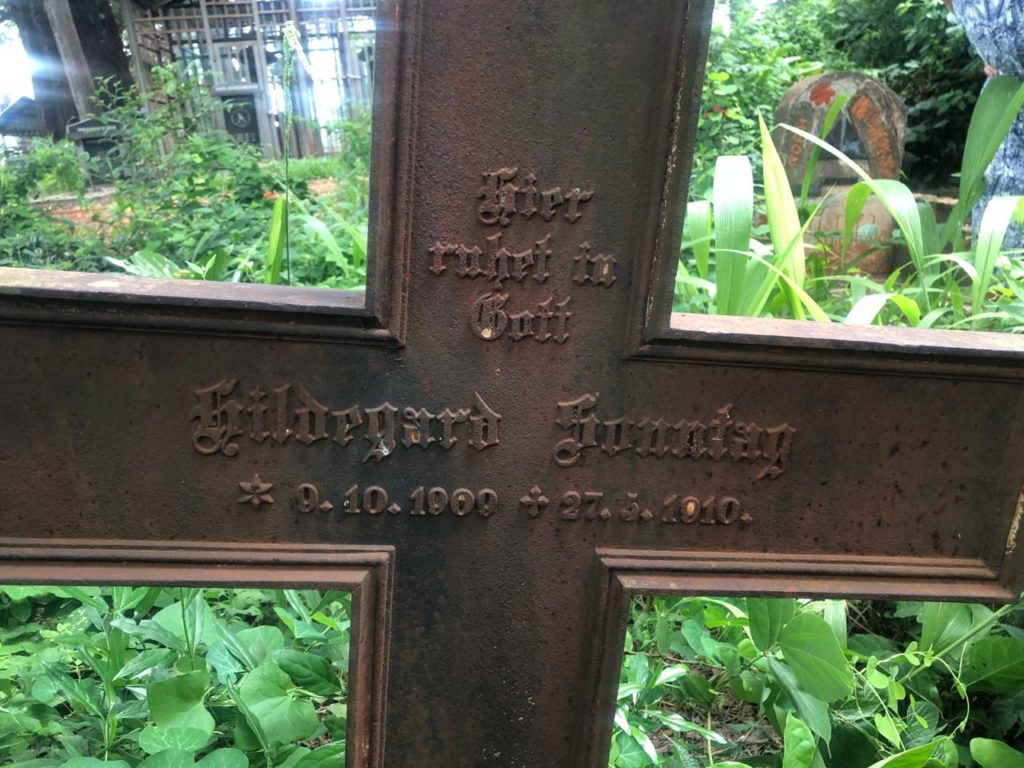
But where does reverence for life come from? From India or China? From Islam or the Nordic religions? From Aztec or Zulu traditions? Or does it perhaps come from secular humanism? Not at all. It comes from the Bible’s teaching that every human being is sacred, created in God’s image, as an Imago Dei.
That is why we must hold on to the Word, as to a lamp in a dark place.
Jesus told us in Luke 15: “If you have lost one sheep out of a hundred, you go after it, until you find it… ” For if we don’t care for one, we will soon not care for any. He also told us in the story of the Good Samaritan, how we should do good even to those who despise us. But, how shall that ever happen, unless we realize Christ himself was that despised Samaritan who came to us, when we lay dying by the roadside, bleeding to death due to our sin?
Human Rights teetering
The long and the short is this: The whole notion of “human rights” will evaporate before the sun, once the Bible disappears from our collective consciousness. It can simply not survive without it. May the living God therefore have mercy on the Rainbow Nation… and on the entire world.
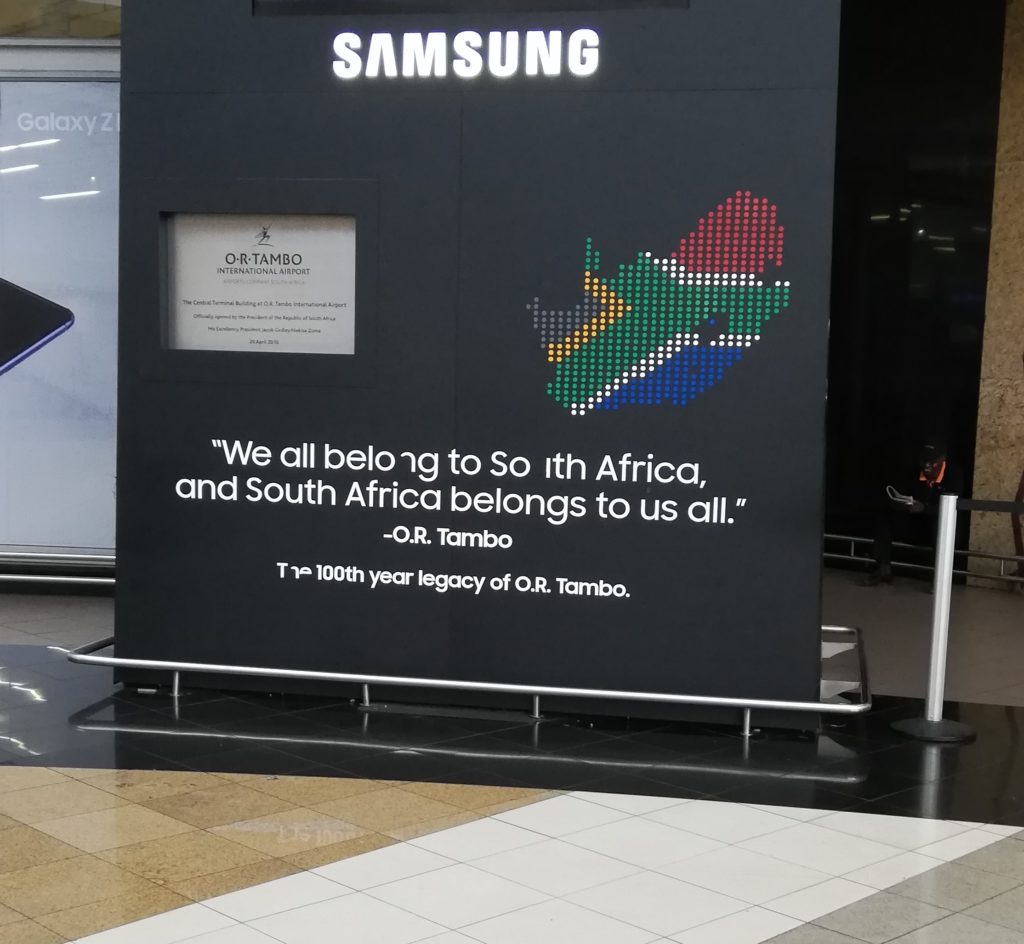
Oliver Tambo Airport in Johannesburg.

